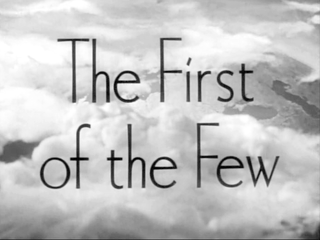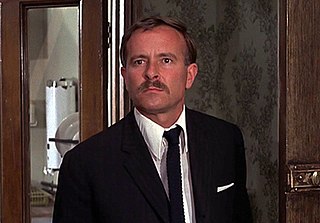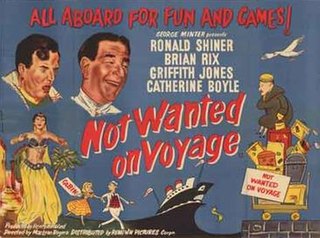
The First of the Few is a 1942 British black-and-white biographical film produced and directed by Leslie Howard, who stars as R. J. Mitchell, the designer of the Supermarine Spitfire fighter aircraft.

Alexander Duncan McCowen, was an English actor. He was known for his work in numerous film and stage productions.

Castaway is a 1986 British biographical-drama film directed by Nicolas Roeg and starring Amanda Donohoe and Oliver Reed. The screenplay was by Allan Scott, adapted from the eponymous 1984 book by Lucy Irvine, telling of her experiences of staying for a year with writer Gerald Kingsland on the isolated island of Tuin, between New Guinea and Australia.

Indiscreet is a 1958 British romantic comedy film produced and directed by Stanley Donen, and starring Ingrid Bergman and Cary Grant.
John Russell Taylor is an English critic and author. He is the author of critical studies of British theatre; of critical biographies of such figures in film as Alfred Hitchcock, Alec Guinness, Orson Welles, Vivien Leigh, and Ingrid Bergman; of Strangers in Paradise: The Hollywood Emigres 1933–1950 (1983); and several books on art.

A Kind of Loving is a 1962 British kitchen sink drama film directed by John Schlesinger, starring Alan Bates and June Ritchie. It was written by Keith Waterhouse and Willis Hall based on the 1960 novel of the same name by Stan Barstow which was later adapted into the 1982 television series A Kind of Loving. The film tells the story of two lovers in early 1960s Lancashire. It belongs to the British New Wave movement.
Jules Buck was an American film producer.

Susan Melody George is an English film and television actress. She is best known for appearing in films such as Straw Dogs (1971) with Dustin Hoffman, Dirty Mary, Crazy Larry (1974) with Peter Fonda, and Mandingo (1975) with Ken Norton.
For Whom the Bell Tolls is a British television series first aired by BBC in 1965, based on the 1940 novel by Ernest Hemingway. It stars John Ronane, Ann Bell, Julian Curry, Glynn Edwards and Joan Miller. The film was adapted for television by Giles Cooper, was produced by Douglas Allen, and was directed by Rex Tucker. It consisted of four 45-minute episodes, the first of which aired on 2 October 1965. The last episode aired 23 October 1965. According to the BBC archives none of the episodes of the film still exist.

Anupama Chopra (née Chandra) is an Indian author, journalist and film critic who served as the festival director of the MAMI Mumbai Film Festival from 2015 to 2023. She is also the founder and editor of the now-defunct digital platform Film Companion, which offered a curated look at cinema with an emphasis on Indian film. She has written several books on Indian cinema and has been a film critic for NDTV and India Today, as well as the Hindustan Times. She also hosted a weekly film review show, The Front Row With Anupama Chopra, on Star World. She won the 2000 National Film Award for Best Book on Cinema for her first book Sholay: The Making of a Classic. Chopra joined the Indian iteration of the film journalism outlet The Hollywood Reporter in 2024, launched domestically in the same year by the RP Sanjiv Goenka Group.

Christopher Thomas Morahan CBE was a British stage and television director and production executive.

They Drive by Night is a 1938 British black-and-white crime thriller film directed by Arthur B. Woods and starring Emlyn Williams as Shorty, an ex-con, and Ernest Thesiger as Walter Hoover, an ex-schoolmaster. It was produced by Warner Bros. - First National Productions and based on the 1938 novel They Drive by Night by James Curtis.

Bless This House is a 1972 British comedy film directed by Gerald Thomas starring Sid James, Diana Coupland, Terry Scott, June Whitfield and Peter Butterworth. It is a spin-off from the television sitcom Bless This House.
Strange Evidence is a 1933 British crime film directed by Robert Milton, produced by Alexander Korda and written by Lajos Bíró and Miles Malleson. Starring Leslie Banks, George Curzon, Carol Goodner and Frank Vosper, it is a film made by Alexander Korda's London Film Productions at British and Dominions Imperial Studios, Elstree, with art direction by R.Holmes Paul.

Three Men in a Boat is a 1956 British CinemaScope colour comedy film directed by Ken Annakin, starring Laurence Harvey, Jimmy Edwards, David Tomlinson and Shirley Eaton. It was written by Hubert Gregg and Vernon Harris based on the 1889 novel of the same name by Jerome K. Jerome.
The Filmgoer's Companion, now published as Halliwell's Who's Who in the Movies, is an encyclopedic reference of film actors, film technicians, directors and producers who have produced or performed in the cinema. The format is a brief biographic introduction, followed by a list of films that they have association. It was originally written by Leslie Halliwell, but since his death in 1989, it has been edited by John Walker.

Not Wanted on Voyage is a 1957 British comedy film directed by Maclean Rogers and starring Ronald Shiner, Brian Rix and Catherine Boyle. It is based on the play Wanted on Voyage by Ken Attiwill and his wife Evadne Price, and was made at British National Studios.

Martin Miller, was a Czech-Austrian character actor. He played many small roles in British films and television series from the early 1940s until his death. He was best known for playing eccentric doctors, scientists and professors, although he played a wide range of small, obscure roles—including photographers, waiters, a pet store dealer, rabbis, a Dutch sailor and a Swiss tailor. On stage he was noted in particular for his parodies of Adolf Hitler and roles as Dr. Einstein in Arsenic and Old Lace and Mr. Paravicini in The Mousetrap.
This is a list of reference works involves encyclopedias and encyclopedic dictionaries of any language published on the subject of film/cinema, radio, television, and mass communications, including related biographical dictionaries of actors, directors, etc.
Bernard Lee (1908–1981) was an English actor who performed in many light entertainment media, including film, television and theatre. His career spanned from 1934 to 1981, although he made his first appearance on the stage at the age of six. He is perhaps best known for playing M in the first eleven Eon-produced James Bond films.













